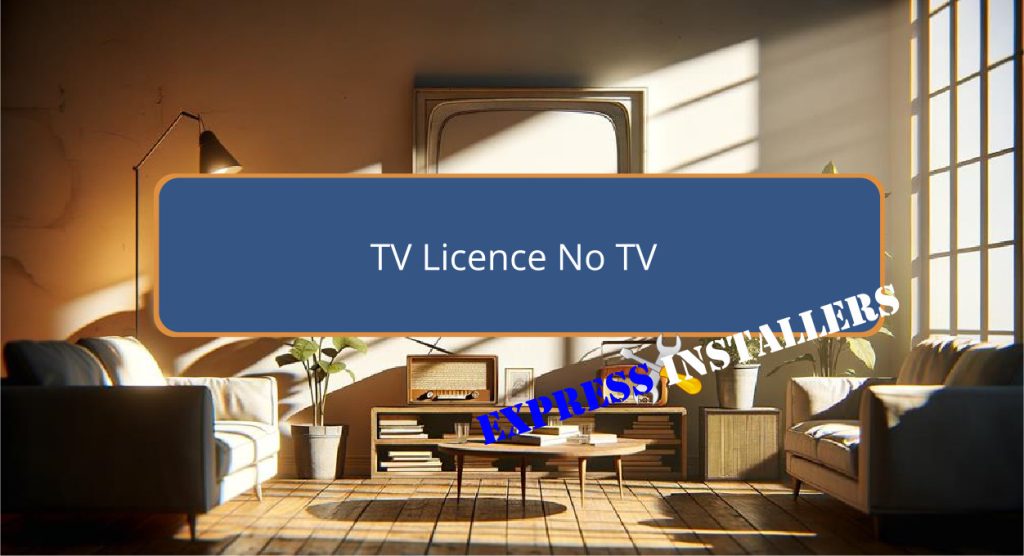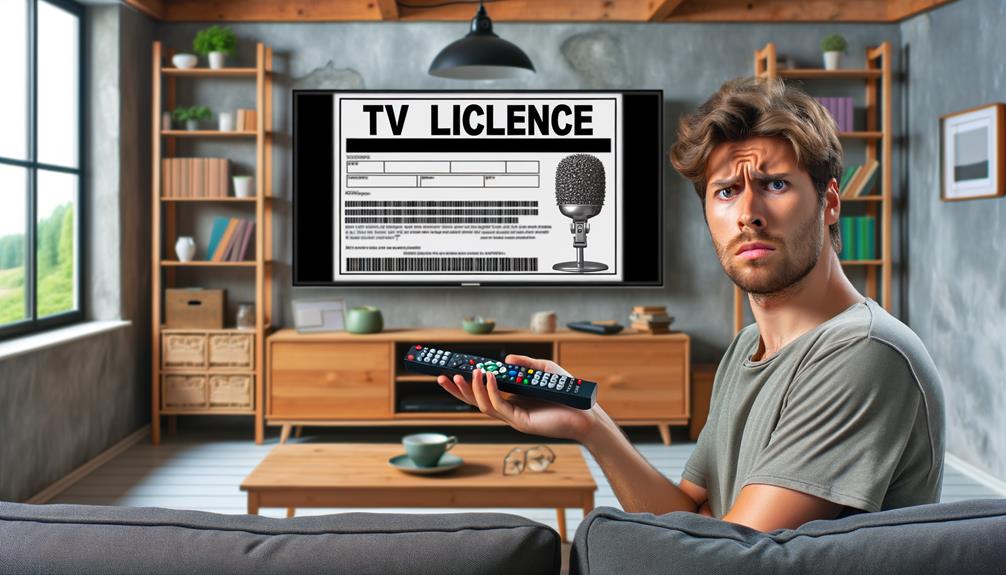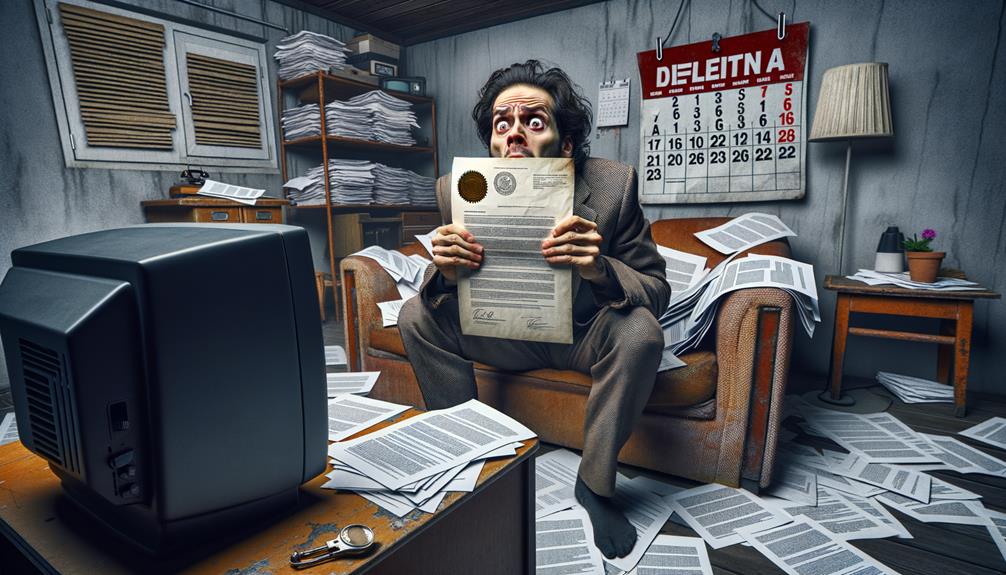
If you don’t watch or record live TV and don’t use BBC iPlayer, you don’t need a TV Licence in the UK. Streaming services like Netflix and Amazon Prime are exempt.
Owning a TV or devices capable of receiving TV signals doesn’t automatically mean you need a licence. However, failure to inform TV Licensing can result in penalties.
You should complete the cancellation and refund request form on the TV Licensing website and be prepared for possible home verification.
Ensuring you comply with these rules can save you from legal and financial repercussions. Discover more about how to manage this process effectively.
Quick Summary
- A TV Licence is not required if you don’t watch or record live TV or use BBC iPlayer.
- Simply owning a TV or devices capable of receiving TV signals doesn’t mandate a TV Licence.
- You must inform TV Licensing if you don’t need a licence to avoid penalties.
- Streaming services like Netflix and Amazon Prime don’t require a TV Licence.
- Cancellation and refund requests can be made through the TV Licensing website.
What Is a TV Licence?

A TV Licence in the UK is a legal requirement for watching or recording live television and using BBC iPlayer. Historically, the TV Licence has funded the BBC since its inception in 1922.
This financial model safeguards the broadcaster’s independence from commercial pressures and government influence, thereby supporting a diverse range of programming.
Public opinion on the TV Licence varies, with some viewing it as a necessary means to uphold quality public broadcasting, while others see it as an outdated obligation in a digital age dominated by subscription services.
When you look at international comparisons, the UK’s approach is unique but not singular. Countries like Germany and Japan also have similar licence fee systems to fund public broadcasting.
However, others, such as the United States, rely primarily on advertising and private donations as funding sources.
This divergence in funding models affects the type and quality of content produced, with licence-funded broadcasters often able to invest in more educational and less commercially-driven programming.
Understanding the historical context and how funding sources impact public opinion provides insight into why the TV Licence remains a contentious yet vital element of the UK’s media landscape.
When You Don’t Need One
Wondering when you don’t need a TV Licence in the UK? If you solely watch catch-up TV services like Netflix, Amazon Prime, or ITV Hub, you’re in the clear.
These streaming services don’t require a TV Licence, making them an important option.
However, BBC iPlayer is an exception; you’ll need a TV Licence to watch any content there.
You can also cancel your TV Licence if you don’t watch or record live TV broadcasts. This means you’re exempt from paying the fee as long as you stick to non-live streaming services.
Even owning a TV or other digital devices capable of receiving TV signals doesn’t necessitate a TV Licence, provided you don’t use them for live broadcast viewing.
It’s essential to inform TV Licensing if you no longer need a TV Licence. Failure to do so could lead to unnecessary penalties.
By understanding these exemptions and exceptions, you can make informed choices about your viewing habits and avoid paying for a service you don’t use.
Always make sure you’re compliant with the rules to enjoy your digital content hassle-free.
Legal Implications

Understanding when you don’t need a TV Licence is essential, but it’s equally important to be aware of the legal implications if you fail to comply with the regulations.
Not having a TV Licence when required can lead to serious legal ramifications. If you’re caught watching or recording live TV without one, you could face a fine of up to £1,000.
This isn’t just a slap on the wrist; the penalties can have a major impact on your financial well-being.
The enforcement actions taken to guarantee compliance are stringent. Detection equipment is employed to locate TV-receiving devices in homes that lack a valid TV Licence.
This technology is quite effective and can result in enforcement officers visiting your home if you’re suspected of watching live TV without a licence.
These visits can escalate quickly to court consequences if the officers gather evidence of non-compliance.
The legal system takes these matters seriously. Prosecution for not having a TV Licence can lead to fines and a criminal record.
Hence, it’s important to either maintain a valid licence or formally inform TV Licensing if you no longer require one, to avoid facing these severe penalties.
How to Inform TV Licensing
To inform TV Licensing that you no longer need a TV licence, start by completing the refund and cancellation request form on their website.
This form is vital for officially cancelling your licence and potentially obtaining a refund if you’re eligible.
The cancellation form requires details such as your licence number, address, and the reason for cancellation.
After submitting the form, TV Licensing may use various contact methods to reach out to you for further information or to confirm your submission.
They might send you emails or letters, or even call you directly. It’s important to respond promptly to avoid any misunderstandings or delays in processing your request.
Be prepared for a verification process, as TV Licensing may conduct a visit to your residence to ensure you’re not watching live TV or using BBC iPlayer.
This step helps them verify that your cancellation is legitimate and that you’re complying with their regulations.
Additionally, be mindful of your refund eligibility. If you’ve paid for a licence that you no longer need, you might be entitled to a partial refund, depending on the unused months.
Always make sure you follow the correct procedures to avoid potential fines and legal repercussions.
Common Misconceptions

Many people mistakenly believe that merely owning a TV or related equipment obligates them to pay for a TV Licence.
This isn’t the case. A TV Licence is only necessary if you watch live TV or use BBC iPlayer. If you use your TV solely for streaming services such as Netflix, Amazon Prime, or for gaming, a TV Licence isn’t required.
One common misconception is that TV Licence enforcement officers will automatically assume you need a licence if they see TV equipment in your home.
However, enforcement efforts are primarily focused on verifying whether live TV or BBC iPlayer is being accessed without a licence.
If you genuinely don’t use these services, you can inform TV Licensing to avoid unnecessary enforcement actions.
Another misunderstanding involves TV Licence refunds. If you’ve paid for a licence but later find you don’t need it, you can apply for a refund. Many people are unaware of this option, leading to unnecessary expenses.
Additionally, students often think they need a separate licence for their university accommodation, but if their parents’ address already has one, they’re exempt.
Clarifying these misconceptions can save you money and stress.
Frequently Asked Questions
Do I Need a TV License With No TV?
You don’t need a TV licence if you lack a TV and only use Internet streaming services or listen to the radio. However, make sure you’re not watching or recording live TV or using BBC iPlayer.
Can I Cancel My TV Licence if I Only Watch Netflix?
Yes, you can cancel your TV Licence if you only watch Netflix and other streaming services. This will save you subscription fees, as a TV Licence is only required for live TV or BBC iPlayer, not on-demand services.
What Channels Can I Legally Watch Without a TV Licence?
You can legally watch free channels and streaming services like Netflix, Amazon Prime, and YouTube without a TV Licence, as long as you’re not watching live broadcasts or BBC iPlayer. Catch-up services like ITV Hub are also allowed.
Who Is Exempt From Paying a TV Licence?
You’re exempt from paying a TV licence if you meet the exemption criteria, such as being 75 or older with Pension Credit or registered blind. License eligibility also includes discounted rates for care home residents and those over 60.
Conclusion
To sum up, understanding when you don’t need a TV licence can save you from unnecessary legal complications and financial costs.
By clearly communicating your situation to TV Licensing, you guarantee compliance with the law.
It’s important to dispel common misconceptions to avoid penalties.
Taking a proactive and informed approach helps you manage your obligations efficiently, ensuring peace of mind while manoeuvring the legal landscape of TV licensing.
